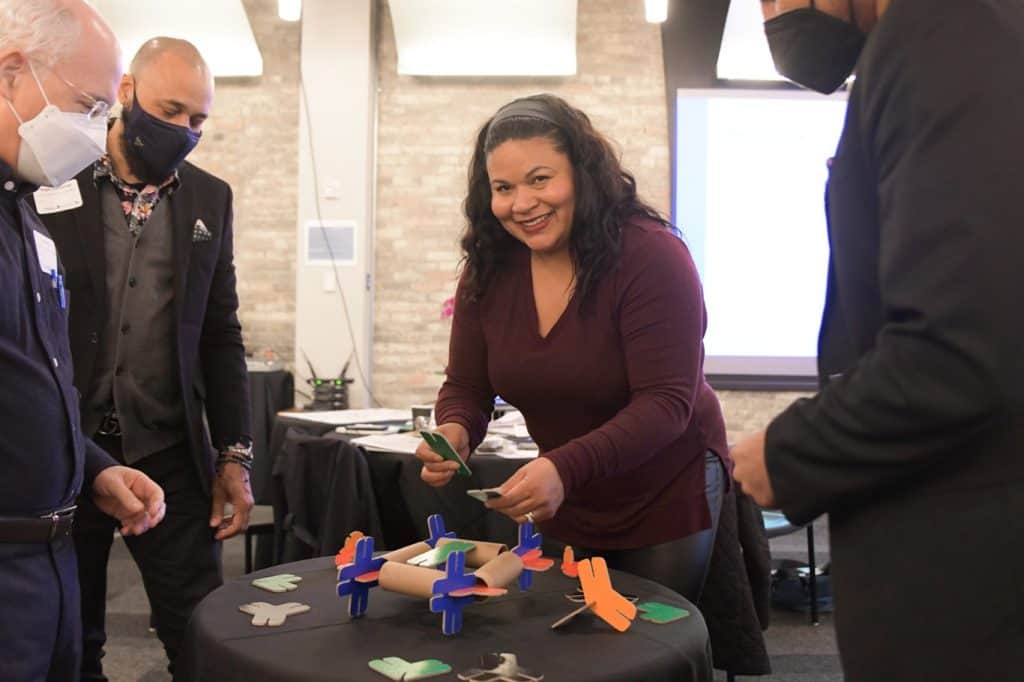Voices of Hennepin Healthcare: Aida Strom

Aida Strom, Hennepin Healthcare’s health equity community engagement program manager, envisions a collaborative healthcare model built with the histories and hopes of those it serves.
“I so strongly believe that every single human deserves good healthcare and respect within the healthcare system,” expresses Aida Strom, a member of the Sisseton Wahpeton Dakota Oyate.
As the health equity community engagement program manager at Hennepin Healthcare, Aida is participating in an innovative planning process to advance health equity. She advocates for a collaborative healthcare model that partners with communities to practice historically informed, consent-based and culturally respectful care. She believes that this is possible at Hennepin Healthcare, recognizing its unique role within the region’s healthcare landscape.
Historically Informed Care
Aida directly experienced the quality of care at Hennepin Healthcare when she delivered her daughter through the midwifery program. “We have an amazing force of doctors, nurses, and medical students,” she affirms. “What I’ve learned is that there should be more training about specific communities — their needs, histories, and realities.”
From 1860-1978, Indigenous children, including Aida’s mother, were removed from their homes and placed in boarding schools — where they were stripped of their native traditions, abused, and forced to assimilate into white-dominant society. “This history has everything to do with where we as American Indian people are now,” Aida mourns.
To address these needs, Aida created a curriculum to train residents, physicians, and providers about recent and historical trauma. “You really need to know who people are when they come in the door to provide better experiences and chip away at inequities,” she says.
Aida is also launching a quarterly health fair with Hennepin Healthcare that will take place in spaces where specific communities feel comfortable. Aida is eager to strengthen partnerships to help all communities “understand the effects of past trauma and learn about potential tools and resources to ease the process of healing.”
She also partners with colleagues like Dr. Talee Vang, PsyD, LP to provide unique education for team members about the effects of historical trauma, the impact of external violence and gaining awareness of internal biases to improve patient care.
As Hennepin Healthcare builds a more equitable system that responds more quickly to patients’ needs, Aida sees an important opportunity to expand and uplift these important education models — and create a national model for training providers to deliver culturally specific care.
Culturally Affirming Care
Aida explains that traditionally, “healthcare does something to you and to your community.” This approach has caused further harm and mistrust in healthcare for many communities, including American Indian communities.
She sees this planning process as an opportunity for Hennepin Healthcare to further help patients and entire communities heal in culturally appropriate ways by asking, “What can we do with you and for you?”
Aida continues, “The American Indian community is my community. When patients come in, I know their families. There’s a different sort of responsibility that I have that can be stressful at times. Being a part of a community, being present and participating is a way to build trust.” She hopes that this current planning process will accelerate current efforts to build up highly diverse physicians, nurses and fellow team members to promote strong, personalized connections between Hennepin Healthcare and the communities it serves.
Spiritually Supportive Care
American Indian culture includes rich spiritual and medicinal practices. However, Aida grieves, “The way that we healed ourselves and understood our spirituality was taken away from us. This is now a rediscovery.” As the community reclaims these practices, they can be integrated into medical treatment with the interest and permission of the patient.
“Weaving whole-person interactions will really promote healing,” Aida encourages. Taking the time to learn and implement the “community’s history, values, ideas and definitions” into healthcare will provide more culturally respectful and patient-specific care. Aida sees the planning process as an opportunity to envision and create physical spaces designed for spiritual and cultural healing for patients from a diversity of racial, ethnic, cultural and religious backgrounds.
Aida remains hopeful in her vision of an ideal healthcare system where “healthcare providers would have the time and space to develop relationships with patients, their families and communities: one where everyone receives amazing, fantastic, quality care.”
Learn more about the planning process and sign up for monthly updates from Jennifer DeCubellis, CEO at hennepinhealthcare.org/ourfuture

